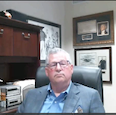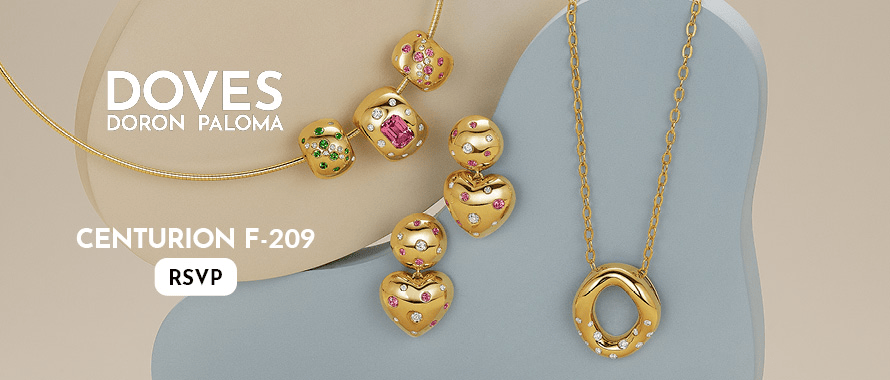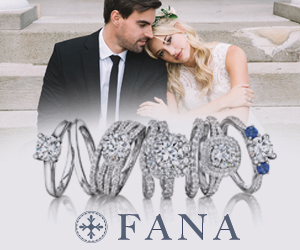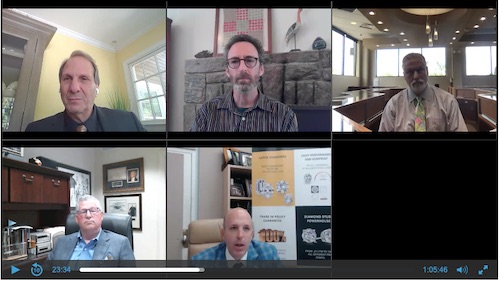Sales Strategy
Getting Back To Normal, Part 2: Advertising, Marketing, And Dealing With Finger-Licking Good Jewelry | August 26, 2020 (0 comments)

Merrick, NY—As the country reopens after the pandemic shutdowns, jewelers are finding their way through a new normal. On the positive side, the pandemic quarantine has been surprisingly good for jewelry sales. Families still have milestones to celebrate, and many also are specifically looking for reasons to celebrate. Jewelry is capturing dollars that would previously have gone to vacations and other experiences, and both couples and families spending a lot of time together are finding their relationships strengthened. Finally, people working from home are looking to accessorize from the neck up for Zoom calls.
In Part One of Getting Back To Normal: Tips From Retailers And Vendors,we talked about selling online and by video, and emotionally connecting with customers. Our series continues this week with ideas for handling sticky--and icky--customer jewelry situations, striking the right tone in marketing, and gently navigating the oft-politicized world of mask wearing.
Related: Getting Back To Normal: Sales Tips From Retailers And Vendors
Our second session wraps up ideas from panelists Asaf Herskovits, CEO, GN Diamond, Philadelphia, PA; Tom Heyman, principal, Oscar Heyman, New York, NY; Rob Simon, principal, Windsor Jewelers, Winston-Salem and Charlotte, NC; and Scott Weisman, principal, Meyers Jewelers, Grove City, OH. Centurion president Howard Hauben moderated.
Howard Hauben: Are you requiring customers to wear masks?
Scott Weisman: Yes, yes, and yes! If they don’t have a mask, we offer a mask. We’ve only had one customer refuse and I took him way in the back away from everybody else and told him he had to do everything out of that area. But nobody else has objected to wearing a mask.
Rob Simon: We put nice artwork up one easels in the front of the store with masks on it, saying we have masks if you don’t have one, we’re happy to get you one.
Hauben: Having checkout counters enclosed in glass is one thing, but how are you showing a client a piece of jewelry or watch, and how are you doing social distance?
Weisman: We have shields everywhere. It’s almost like a bank teller situation. We have little areas where they slip everything under, and that’s it. That’s mandatory by our state.
Hauben: How do you handle it when a customer gives you a piece of jewelry to repair? What do you do?
Weisman: We’re trying to tackle that. What do you do to it before you take it back to the shop? I’m sure [other jewelers] have had this too: someone can’t get their ring off so they put their finger in their mouth or lick the ring and then slide it off. I don’t think any of my staff will want to touch it! Those are the quirky things you deal with in retail but what are you going to do? You can’t insult the customer, but you have to find your way through that.
Editor’s note: Some of the solutions presented were to spray it with disinfectant, drop it in Barbasol or use alcohol wipes.
Hauben: What sales and marketing key points are you hitting now?
Weisman: Although we all wear a lot of hats in an independent family business, that’s my brother’s hat. For example, our Sunday newspaper ran full-page ad of my brother and I wearing masks and holding Windex and holding jewelry, telling people we’re back and ready to help them. We put it on Facebook, Instagram and all that.
We try to do comical ads. It makes people feel comfortable. We end every TV commercial with us pointing into the camera, and customers come in wanting to point at us. I’m curious as to who’s pointing now with a mask on. You have to get people comfortable coming back into the store. We offer curbside drop-offs and pickups. I always joke, “What kind of hamburger did you order?” It keeps things light. I tell people I feel like the guy at Wendy’s who screwed up the order and now has to bring it out to your car. Then we talk about, ‘do they need a new head on the ring?’ I bring my loupe out and examine it right there in front of them.
Simon: I think we all know that most folks who normally travel in summer are concerned about flying, about staying in different locations, so things are staying on a more local basis. That’s our time to step up. We’ve been doing advertising about supporting local businesses—not just ours, but all local businesses in the community.
Hauben: What about marketing?
Simon: We’re hitting advertising fairly consistently. We negotiated with our billboard company. They wanted us to keep paying [during the shutdown], I said ‘Ok, then take our signs down.’ They said, ‘you have a contract’ and I said ‘ok, let’s go out and do a traffic count and see how that’s going these days.’ It’s like you have to do a little wakeup call because everybody’s under a certain pressure to do business, so you have to respect that—but everybody has to meet in the middle. Everybody’s been hit in the stomach with a baseball bat, so we all have to take easy breathing together.
Weisman: We met with all the major radio stations to see when we would go back on air. I wanted to wait till we saw how much money is coming in so we know where to put our money.
Simon: I think it’s important that we don’t pause too much advertising. I have always believed the loudest barking dog gets the most attention, as long as you do it tastefully. I don’t want us to get labeled that we’re trying to sell luxury goods during a pandemic, I just want us to be seen supporting everybody.
Weisman: Our watch battery repair benefits charity. We pick a local charity every year, and 100% of our watch battery sales are donated to them. We charge $10 a battery, and the charity gets between $10,000 and $15,000 It’s a true local charity that helps kids. We’re going to start that back up, but [the shutdown] hurts the charity a bit.
I’m a member of pretty much every church, synagogue, Little League team, and so on. That’s what my dad always did and that’s what we do. I don’t think I’ve ever said no to any single charity that’s walked in the door, whether we give them a piece of jewelry or money towards it. That’s why we do this battery thing. You get a lot out of it. We got a new big customer whose child is part of that program. He wanted to support us because we support where his kid is.
Simon: I think it is essential not to miss your anniversary or your wife’s birthday. That is an essential part of life, celebrating important moments, and there are a lot of important moments in this pandemic. Families are back together and doing more things together than they’ve ever been. They’re walking together, doing things at home together. I think there are a lot of great things that have come out of it, so you have to give messages to support these good moments and to appreciate life. I’ve certainly had a different focus on things.
Hauben: What about vendors? What are you doing?
Tom Heyman:We’re looking at what we can do to support the stores. For the fourth quarter, we’ve produced our fall catalog and produced not just the catalog but have images for stores to use for local advertising. But I also agree with what Rob mentioned, not to skip those good events for people. Particularly in times like these, people want to pay attention to all the good things going on. Birthdays, anniversaries, graduations. You don’t want to only focus on the negative.
I think out of this we’ll have whole new ways of doing business. Lots of things that will continue forward for years and years.
Related: How Do You Shoot A Jewelry Catalog In A Pandemic?
Asaf Herskovits: We’ve created dozens of turnkey solutions for first-time bridal. At any given time, even now, 7% of the population is in the market for a diamond. People might not have been going into stores [in spring] so we’re seeing pent-up demand. Couples are ready to get engaged much quicker, they’re not going to wait till New Year’s or something. We’ve created social media posts, email campaigns, and even spiels for jewelers to call customers and talk to them. We’re encouraging retailers to have sales associates cold-call successful people in town and get them to come in for a first time, offer to sanitize their jewelry while they shop.
Simon: We also have to thank all our vendors. Everybody made a tremendous amount of effort to do Zoom trainings. Our people have had great training, and can get online and make sales.
Click here or on the image above to watch the entire replay.
HH: What is the biggest thing keeping you up at night about your business?
Herskovits: As loose diamond wholesaler, people might think we’re Bank of America or Simon Malls, but when you’re working on 7% margins and have a lot of family and employees to pay in the business, we need people to pay their bills. My biggest concern is to be there for our clients, but I need them to understand that they also have to take care of us, and it’s a real true partnership. That’s how we got through 2008-2009 and September 11, because it was a true partnership with clients.
Simon: I went into this with a lot of stress. How long, how deep is this going to go, what are our contingency plans, how do we support our employees, how do we take care of our obligations, our families? We were having money going out at 90 miles an hour and coming back in at six miles an hour. How fast we can ramp business back up to what we consider is the norm and how we can convince people that we’re safe? [I was] concerned about getting business ramped back up to have money to pay employees, commitments, and vendors—but also to see our community get back to being a happy place.
We went through 2008-2009 and we’re seasoned and understand those things, so we realize there’s always survival, there’s always the next thing, the next step, and every adversity gives us tons of equal seeds of the next opportunity. We just have to look for them.
Heyman: One of my concerns is that the whole industry has to survive. The retailers have to survive to have demands of me, and I have to survive to have demands of the stonecutters and dealers, and the whole [supply] chain. It’s always been a very close industry where we know people for decades and decades. I think the industry will survive but I think it will shrink a little and those that survive will be stronger.
Weisman: I think simply everything that Rob said is what every single retailer is thinking out there. It keeps me and every other retailer up at night.
Hauben: Have either of you seen an increase in online sales since last year?
Weisman: We don’t do online sales. We show things and say call for interest. We do Podium and do sales that way but not online. Our Podiums are up 20% to 40%. I spend about 2 hours a day answering Podium messaging.
Simon: A lot of brands we have frown upon selling e-commerce. Our online is a billboard to get people to call or come in. We’ve now sold some things from that and we’ve done curbside or free shipping. The video shows we’ve done have ended up garnering some sales. Done three or four like that and some people would come pick up but mostly it was free shipping.
Hauben: Do you have any final words of wisdom?
Herskovits: Somebody I look up to, Warren Buffett, said ‘never bet against America.’ This industry is resilient. There is gold to be melted to drum up cash, there’s first-time bridal, and love it not dead. If you partner with the right vendor we’re not just going to survive, we’re going to thrive.
Heyman: Please be safe, healthy, and smart. If we’re smart the industry will survive. Clients still have events and will need to celebrate. We will get through this. It will take a little time, but if we all work hard we’ll get there.
Simon: The theme of my last Zoom meeting was Back To The Future. Had a DeLorean image behind me. We have a great trainer, Jim Douglas, who said the sun is now rising. We all need to go get that fresh attitude and let the past be the past and keep moving and making businesses work.
Weisman: I think every business is individualized, whether retailer or vendor. Rob had a motivator on Zoom, but that wouldn’t fit our store, our style. Every store has to figure out what its life blood is, what gets them ticking and motivated. For me, it was my dad’s business so I’m motivated to make it better in his honor. Grab hold and get ready, because it’s going to be a crazy ride.







